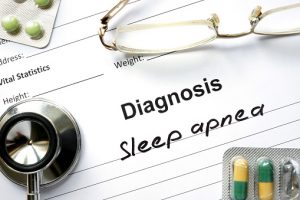 Smartphone device may assess your sleep-wake cycle and help your monitor your obstructive sleep apnea (OSA). Researchers from Ben-Gurion University of the Negev (BGU) developed a system of monitoring sleep-wake cycle among patients by simply using the patient’s smartphone.
Smartphone device may assess your sleep-wake cycle and help your monitor your obstructive sleep apnea (OSA). Researchers from Ben-Gurion University of the Negev (BGU) developed a system of monitoring sleep-wake cycle among patients by simply using the patient’s smartphone.
Dr. Yaniv Zigel, head of BGU’s Biomedical Signal-Processing Research Lab (BSP) and Professor Ariel Tarasiuk, head of the Sleep-Wake Disorders Unit at Soroka University Medical Center in Beer-Sheva, explained, “We’ve developed technology that could help diagnose OSA and sleep disorders in a convenient way. The audio-analysis application can record speech signals from awake subjects. Now, we will be able to get a fast, OSA severity estimation without an overnight sleep study.”
Advertisement
Usually, sleep apnea sufferers have to go through a test known as polysomnography (PSG), which records brain waves, blood oxygen level, heart rate, breathing, and leg and eye movement while asleep. This method involves contact sensors, but the new system does not. The new technology is installed within the smartphone or any other device that uses ambient microphones. It analyzes speech while the patient is awake and assesses breathing while they are sleeping. This new method is much simpler to use and less expensive.
Eliran Dafna, developer of the sound-breathing system, explained, “All sleep studies conducted in laboratory or at-home settings currently require subjects to be connected to numerous electrodes and sensors. Processing the data on sleep-wake states and corresponding aspects of physiology is time-consuming, tedious, and costly because of its complexity and the need for technical expertise. The market is begging for a better solution.”
Professor Tarasiuk concluded, “We are excited about this non-contact sleep tracking system, which does not require patients to wear uncomfortable monitoring equipment on their body. This application can also be very useful for CPAP (continuous positive airway pressure) machine users who want to check the effectiveness of their sleep apnea therapy.”
Tips to prevent sleep apnea
If you suspect you have sleep apnea, talk to your doctor. The most common treatment for sleep apnea is CPAP machine, which is a facial mask worn during sleep to supply a constant and steady air pressure to open airways and promote breathing.
Advertisement
Other means of preventing and managing sleep apnea:
- Managing your weight – obesity is a common risk factor of sleep apnea
- Limiting alcohol use
- Quitting smoking
- Treating nasal congestion and ensuring breathing airways are open
- Sleeping on your side as opposed to your back.
By following these simple tips, you can successfully manage and prevent sleep apnea and the associated health conditions.
Getting a good night’s rest is vital for good health, so if you’re not getting in a restful sleep, consider it a wake-up call to action. If you’re concerned about sleep apnea, speaking with your doctor is your best bet. Knowing your risk factors is also important as it can help treat your condition when it’s at its mildest.
